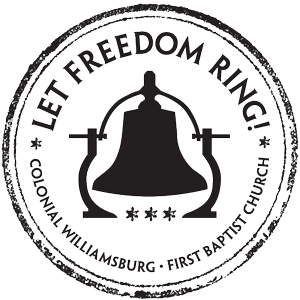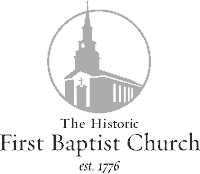Press
Founded in 1776, a Historic Black Church Challenges the Nation to Ring a Long-Stilled Bell
Against a contemporary backdrop of racial tension, Colonial Williamsburg to restore a church bell silent since segregation and let it ring for freedom for all of Black History Month
In 1776, the year of America’s independence, a group of enslaved men and women secretly founded the First Baptist Church in Williamsburg, Virginia. The church, which celebrates its 240th anniversary in 2016, is today one of the country’s oldest African-American houses of Baptist worship1, and a symbol of the faith, struggle, and perseverance that marks the black experience in America. The First Baptist Church — whose first members met under thatched arbors in the woods — moved to a brick church building before the Civil War and acquired a bell in the late 19th century. Since the days of segregation, the bell has been inoperable…unheard throughout the tumult and progress of the civil rights movement and in the presence of famed worshipers including Dr. Martin Luther King, Jr. and Rosa Parks. The Colonial Williamsburg Foundation, which had a key role in building the church at the current site, has pledged to restore the bell to working condition and to challenge the nation to ring it throughout the day — every day — for Black History Month in February 2016.
“Bells call people to faith. They send folks forth to do good work in the world,” said Reginald F. Davis, Pastor of First Baptist Church. “But Dr. Martin Luther King, Jr., who prayed in our church, also said that freedom rings. A silent bell represents unfinished work of freedom and equality. This bell, in this sacred and historic church, will be silent no more.”
An engineering and conservation team led by Colonial Williamsburg experts is already on site at the church to determine the age, foundry, and provenance of the bell, and to begin the painstaking process of restoring it in time for it to toll throughout Black History Month.
“We are going to challenge the nation, Americans of every color, faith, and creed, to take a turn at ringing the bell,” said Mitchell B. Reiss, president and CEO of The Colonial Williamsburg Foundation. “This church and this bell follow the arc of the American story of independence, but this was a dream deferred for far too many. As a nation we constantly strive to form a more perfect union, based on liberty, rule of law, and human dignity, and as current events remind us, that work is forever unfinished.”
Black History Month also will be honored by Colonial Williamsburg, the First Baptist Church, and The College of William & Mary with an unprecedented range of special programs offered daily during the month of February. This will include a new exhibition at the Abby Aldrich Rockefeller Folk Art Museum, A Century of African-American Quilts; daily lectures and live theater throughout the historic area; concerts, film festivals, oral histories; and gospel music and church services at the First Baptist Church. One of Colonial Williamsburg’s full-time interpreters — James Ingram — portrays the first pastor of First Baptist Church, the enslaved preacher, Rev. Gowan Pamphlet.
“Colonial Williamsburg is in the story-telling business,” said Ingram. “We tell the story of America, including our arduous journeys through prejudice and injustice. We want people to come and take their turn, to take their place in the American story, and to help heal the nation of the divides that remain among us.”
Colonial Williamsburg’s conservation efforts at First Baptist Church will go beyond those for the bell itself. In addition, Colonial Williamsburg’s conservation team will clean and conserve several historic communion vessels owned by the church, as well as conserve two marble carved gravestones from 1851 and 1866 that marked the graves of two free blacks buried in Williamsburg.
“Colonial Williamsburg is pleased to bring its conservation expertise to bear on the preservation of these important artifacts, which help to illustrate the deep and rich history of Williamsburg’s African-American community,” said Ronald L. Hurst, Colonial Williamsburg’s vice president for collections, conservation, and museums and its Carlisle H. Humelsine chief curator.
The Let Freedom Ring challenge is made possible in part by a generous grant from the Ford Foundation of New York.
For more information, or to reserve your spot at the rope please visit LetFreedomRingChallenge.org
[1] A small number of black Baptist churches can legitimately claim to be the oldest in America — First African Baptist in Savannah, Ga., for example, and Silver Bluff Baptist Church in Jackson, S.C. However, First Baptist Church in Williamsburg is believed to be the first black Baptist church that was organized entirely by African Americans.
About the Colonial Williamsburg Foundation
The Colonial Williamsburg Foundation preserves, restores and operates Virginia’s 18th-century capital of Williamsburg. Innovative and interactive experiences, such as the street theater Revolutionary City® and the RevQuest: Save the Revolution!TM series of technology-assisted alternate reality games, highlight the relevance of the American Revolution to contemporary life and the importance of an informed, active citizenry. The Colonial Williamsburg experience includes more than 400 restored or reconstructed original buildings, renowned museums of decorative arts and folk art, extensive educational outreach programs for students and teachers, lodging, culinary options from historic taverns to casual or elegant dining, the Golden Horseshoe Golf Club featuring 45 holes designed by Robert Trent Jones and his son Rees Jones, a full-service spa and fitness center, pools, retail stores and gardens. Philanthropic support and revenue from admissions, products and hospitality operations sustain Colonial Williamsburg’s educational programs and preservation initiatives.
About First Baptist Church
First Baptist Church of Williamsburg originated in 1776 with a quest by a group of courageous slaves and free blacks who wanted to worship God in their own way. In their search, they left the church of slave owners, such as Bruton Parish Church, where worship was formal and restrained. First led by Moses, a free black itinerant preacher, they built a brush arbor at Green Spring Plantation a few miles from town to gather secretly in song and prayer. Organized as Baptists by 1781 under Rev. Gowan Pamphlet, an enslaved man in Williamsburg, worshippers moved to Raccoon Chase, a rural area just outside Williamsburg. A member of the white Cole family, moved by their stirring hymns and heartfelt prayers, offered the group the use of his carriage house on Nassau Street for a meeting place. Pamphlet continued as pastor until his death about 1807. The African Baptist Church, as it became known before the Civil War, dedicated a new brick church on Nassau Street in 1856, the congregation’s church home for the next 100 years. It was renamed First Baptist Church of Williamsburg in 1863. The present church at 727 Scotland Street has served the congregation since 1956.
Media Contact:
Joseph Straw
Public Relations Manager
Historic Area, Museums, Education and External Affairs
Telephone: (757) 220-7287
Email: jstraw@cwf.org


